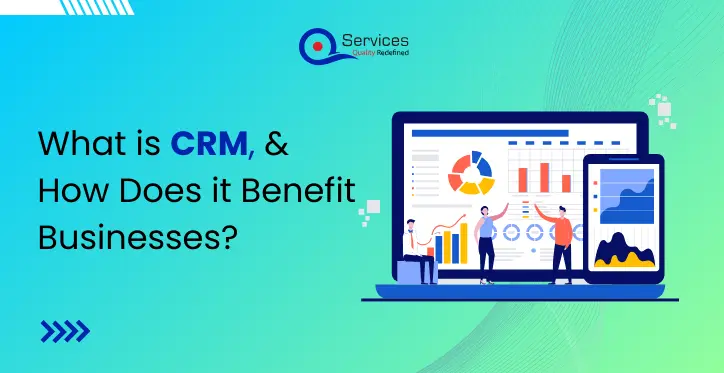Home » What is a CRM, and How Does it Benefit Businesses?

To keep your customer satisfied is crucial for any business, and that’s where Customer Relationship Management (CRM) comes in. CRM is a management approach used by various organizations to manage information about their customers, understand their needs and ensure that they receive a good customer experience.
According to a recent stat from NewvoiceMedia.com, 51% of customers won’t stick around if they have just one bad experience with a company. This emphasizes the significance of customer relationships. To maintain a strong foothold in the business environment, businesses need to focus on better CRM solutions as it helps them avoid losing customers by keeping all their information in one place, making communication easier, and simplifying processes.
A customer relationship management (CRM) system is made up of an extensive set of features and tools designed to maximize several aspects of corporate processes. It is fundamental for businesses looking to improve their customer relationships. It produces insightful business reports, manages leads effectively, applies data analytics and business intelligence for data-driven decision-making, automates workflows to increase productivity, and seamlessly integrates customer service and marketing initiatives, which enhance customer loyalty through personalized experiences. The main goals of a strong CRM automation system are to efficiently manage leads and improve sales processes through strategic customer insights, which raise worker productivity by automating repetitive tasks.
Get free Consultation and let us know your project idea to turn into an amazing digital product.
The ability of CRM to use data-driven insights facilitates rapid business growth. CRM finds untapped opportunities, customer preferences, and industry trends with its advanced analytics. Corporations can use this information to create focused plans, enhance their product lines, and reach a wider audience. As a result, there is not only growth but also strategic growth, where resources are allocated sensibly, and customer-focused strategies promote long-term success.
CRM’s pivotal role in providing quick and comprehensive access to customer information is supported by robust database management. Utilizing cloud-based technologies, CRM ensures real-time data accessibility, fostering agile decision-making. This dynamic access empowers teams with a 360-degree view of customer interactions, enabling them to anticipate needs, personalize experiences, and build long-term customer relationships with a profound understanding of their preferences and history.
Automation within CRM is elevated with sophisticated CRM integrations, extending beyond data entry to optimize complex workflows. Through integrations with artificial intelligence and machine learning platforms, CRM systems automate routine tasks such as lead qualification and follow-ups, enhancing efficiency and reducing errors associated with manual input. This streamlined, error-free workflow allows teams to focus on strategic initiatives, all made possible through seamless CRM integrations .
CRM solutions are essential for improving accountability as they carefully record and manage customer interactions. It promotes transparency by making utilization of audit trails and user logs, ensuring that all team members’ actions are documented. Measurable measures like sales targets, response times, and customer satisfaction ratings are all part of this accountability culture. CRM strengthens a culture of accountability by constructing a history of engagements, which coordinates teams with business objectives and improves performance throughout.
CRM’s capacity to streamline support procedures is the foundation of its cost-saving contribution to effective customer service. It reduces the workload on customer support workers by using chatbots to automate basic questions, classifying and prioritizing support tickets, and offering self-service choices. This reduces the number of resources allocated and improves reaction time, which lowers operating expenses and improves customer satisfaction. The result is a strategic allocation of resources for optimal service delivery.
Dynamics 365 CRM integrations into your business helps elevate customer engagement and overall operational efficiency. However, before delving into its functionality, let’s first understand what it is. Microsoft Dynamics 365 CRM is software introduced by Microsoft to manage sales, generate leads, provide data-driven customer insights, and resolve customer service issues.
From capturing and prioritizing leads to delivering personalized field service experiences, Dynamics 365 transforms how businesses engage with customers and optimize internal processes. Let’s explore the key functionalities of dynamics 365 CRM in various departments.
Microsoft dynamics manages sales by providing real-time access to customer data, it simplifies lead management, allowing teams to capture, qualify, and prioritize leads based on specific criteria and behaviours. The platform goes beyond, incorporating robust opportunity management functionalities for tracking sales, providing valuable insights through analytics, and monitoring key metrics. From order management to invoice tracking, Dynamics 365 sales ensures a holistic and efficient approach to sales operations.
Microsoft Dynamics 365 transforms how businesses tackle marketing-related tasks by encouraging innovation and teamwork. With enterprise-ready collaboration tools, the platform simplifies marketing tasks and makes it easy for teams to organize, oversee, and carry out multi-channel campaigns. The marketing automation features of Dynamics 365 increase productivity, enhance customer service interaction, shorten time to market, and realize marketing goals. Dynamics 365 offers extensive tools for marketing success, ranging from lead nurturing and campaign management to analytics and ROI analysis for assessing the efficacy of marketing initiatives.
Microsoft Dynamics 365 is a game-changer in simplifying the retention phase of the customer lifecycle. The platform offers a user-friendly interface combined with robust data analysis and predictive care capabilities. This empowers customer service teams to streamline case resolutions, reduce response times, and enhance the quality of resolutions. Dynamics 365 introduces AI-driven service bots that increase customer self-service, freeing up valuable time for customer service agents to engage in more meaningful interactions that consistently exceed customer expectations. It’s a customer service revolution prioritizing efficiency and satisfaction.
Dynamics 365 extends its capabilities to field service, providing a comprehensive solution that fosters meaningful connections with customers for long-term trust building. Field agents leverage the platform to streamline scheduling, manage inventory, automate work orders, perform preventative maintenance, and deliver personalized service experiences. This end-to-end solution ensures that field service operations are not only efficient but also focused on building lasting relationships with customers.
Microsoft Dynamics 365 provides a powerful set of features for project services that transform project management. Dynamics 365 is the go-to tool for end-to-end project management, from drafting project estimates and contracts to estimating resource needs and profitability. The platform facilitates efficient project planning, time and expense management, and in-depth analytics to identify areas for optimization, ensuring that project teams can deliver customer-centric service with collaborative tools and analytics at their fingertips.
Dynamics 365 delivers a thorough perspective of an organization’s financial health with a set of potent tools and user-friendly dashboards. These insights can be used by management to make well-informed decisions and deploy resources wisely for maximum effectiveness. Dynamics 365 Financial CRM simplifies important finance management processes in addition to financial analytics. The platform offers a unified and efficient approach to financial management, from planning and budgeting to tracking expenses and financial reporting.
A robust CRM system proves indispensable in elevating sales strategies. By integrating advanced features such as intelligent lead prioritization and email interaction capture, the system optimizes sales efficiency, ensuring focus on leads with the highest likelihood of conversion. This, coupled with timely insights into customer engagement, enhances overall sales effectiveness, guiding businesses on the opportune moments for outreach. It maximizes revenue potential inside current deals by strategically identifying upsell and cross-sell opportunities.
The selection of a CRM system is critical to the effectiveness of a well-executed client retention strategy. By encouraging more accessibility and using the correct technologies to organize customer data, businesses can enhance their relationships. By comprehending the reasons behind customer attrition and leveraging features like personalization, service integration, and loyalty programs via an efficient CRM, they can stay in touch, react to problems promptly, and reward loyal customers. Eventually, these efforts will support continued growth.
Implementation of a CRM system significantly enhances customer service for small businesses in several ways. Firstly, it allows businesses to maintain regular communication with customers through personalized emails. The system enables personalized communications by utilizing customer data, incorporating their names into emails and other interactions, and providing a more connected and positive customer experience.
A CRM system excels at achieving consistency in customer messaging and support by automating timely responses to inquiries. The central database consolidates all customer information, ensuring accessibility for all employees and contributing to a positive customer experience. Beyond its organizational capabilities, a CRM system serves as a valuable tool for understanding customers, storing data on purchases, website browsing, and social media interactions. This wealth of information enables businesses to tailor offers, recommend products, and provide personalized services.
CRM serves as a dynamic tool for small businesses, providing a comprehensive platform for data analytics. By thoroughly examining customer data, sales metrics, and marketing insights, CRM systems facilitate the extraction of valuable information crucial for better decision-making. Small businesses can gain a thorough understanding of their customer base by analyzing a range of data types, such as customer demographics, behaviors, preferences, and sales performance. This in-depth insight empowers businesses to make strategic decisions, tailor customer engagement strategies, and identify growth opportunities. With the right tools, including analytics software and data visualization platforms, coupled with skilled analysts, CRM ensures accurate data interpretation, enhancing the overall quality of insights.
A CRM system effectively manages sales for small businesses through its cost-effective features. By streamlining the sales process, from lead identification to team management, the CRM optimizes efficiency and reduces the time and costs associated with closing deals. Through automation, the CRM minimizes the need for extensive marketing and sales teams, leading to reduced overhead expenses. Additionally, the system’s ability to centralize customer data and facilitate efficient follow-ups contributes to lowering customer acquisition costs. Small firms can utilize their resources and meet sales objectives in an efficient and cost-effective manner due to the elimination of paperwork, streamlined operations, and increased team performance.
CRM systems offer small businesses an efficient solution for sales forecasting, enhancing their ability to monitor, forecast, and strategically plan their sales funnel. CRM advanced features provide invaluable insights for business development. Through its clearly defined sales funnel, CRM systems provide visibility and control from the initial interaction to deal closure, allowing businesses to forecast success more accurately. They also offer a deep understanding of past sales funnels, providing insights into success rates, sales velocity, and conversion rates. It automatically identifies and addresses incomplete or incorrect information, contributing to an accurate forecast. By monitoring the entire sales funnel, CRM systems enable businesses to track and qualify leads, categorize sources, and make informed decisions on marketing investments.
CRM (customer relationship management) systems, like Dynamics 365 CRM and ERP business, streamline operations, facilitate effective customer contact, and provide data-driven insights for well-informed decision-making, all of which contribute significantly to the increased productivity of small firms. Implementing CRM has several benefits, including enhanced responsibility, cost savings, and the potential to support rapid expansion and workflow automation. CRM solutions are useful for small organizations in the areas of client retention, sales management, and service improvement. Businesses should use CRM systems to maintain sustainable growth and a customer-centric mindset in a competitive business environment.

Content writer

Founder and CEO

Chief Sales Officer
